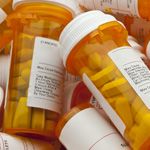Think before you toss: How to properly dispose of old medications
 When you’re cleaning out your fridge and find an expired container of yogurt, you just toss it in the trash. But cleaning out your medicine cabinet requires a little more thought. Leftover prescription medications must be disposed of carefully; if they aren’t, they could be toxic for the environment, or they could fall into the hands of people who shouldn’t have them.
When you’re cleaning out your fridge and find an expired container of yogurt, you just toss it in the trash. But cleaning out your medicine cabinet requires a little more thought. Leftover prescription medications must be disposed of carefully; if they aren’t, they could be toxic for the environment, or they could fall into the hands of people who shouldn’t have them.
You may have leftover medication due to a change in therapy, a reduction in your dosage, or because you had an adverse reaction that you reported to your doctor. According to Covenant Emergency Care Center pharmacist Rob Granett, “These medications are incredibly potent, and making sure that they’re not getting into the wrong hands is definitely critical.”
So what should you do?
Disposing of Unused Medications
Your best bet is to find a drug take-back or collection event near you. You can find an approved disposal location at this Drug Enforcement Administration website. Other organizations that often have drug disposal events are:
- Police departments
- Fire departments
- Hospitals (Covenant periodically hosts take-back events)
- State departments (such as the Department of Public Health)
What if you can’t find a disposal location or take-back event near you? The Food and Drug Administration (FDA) recommends following these steps to dispose of unused medications:
- Mix medicines together. Do not crush them.
- Combine the mixed medications with an inedible substance, such as dirt or cat litter.
- Place this mixture into a sealed container.
- Throw the container into your household trash.
- Before you dispose of the empty bottles, remove any personal information on the prescription label.
Why go to so much trouble?
Why not just toss your medications into the trash or flush them down the toilet? Here’s why:
- Drugs in the trash can be accessible to children and pets, who could be seriously harmed by prescription medications. According to the FDA, about 60,000 emergency department visits are made after children under the age of six find and ingest adult medications.
- Drugs in the trash, especially opioids, could be found by unscrupulous individuals who would sell them to others. The opioid epidemic in the U.S. has grown exponentially in the last 20 years; overdose deaths have quadrupled since 1999.
- Flushing some medications down the toilet could negatively affect the environment and water supply. However, the FDA does have a “flush list” of medications that are so harmful if ingested, they recommend flushing if no immediate alternative is available.
This infographic from the FDA conveniently summarizes your drug disposal options.
[NOTE: The drug take-back event referenced in the interview has already occurred; watch the Covenant HealthCare event calendar for upcoming events.]
Posted Date: 7/16/2019